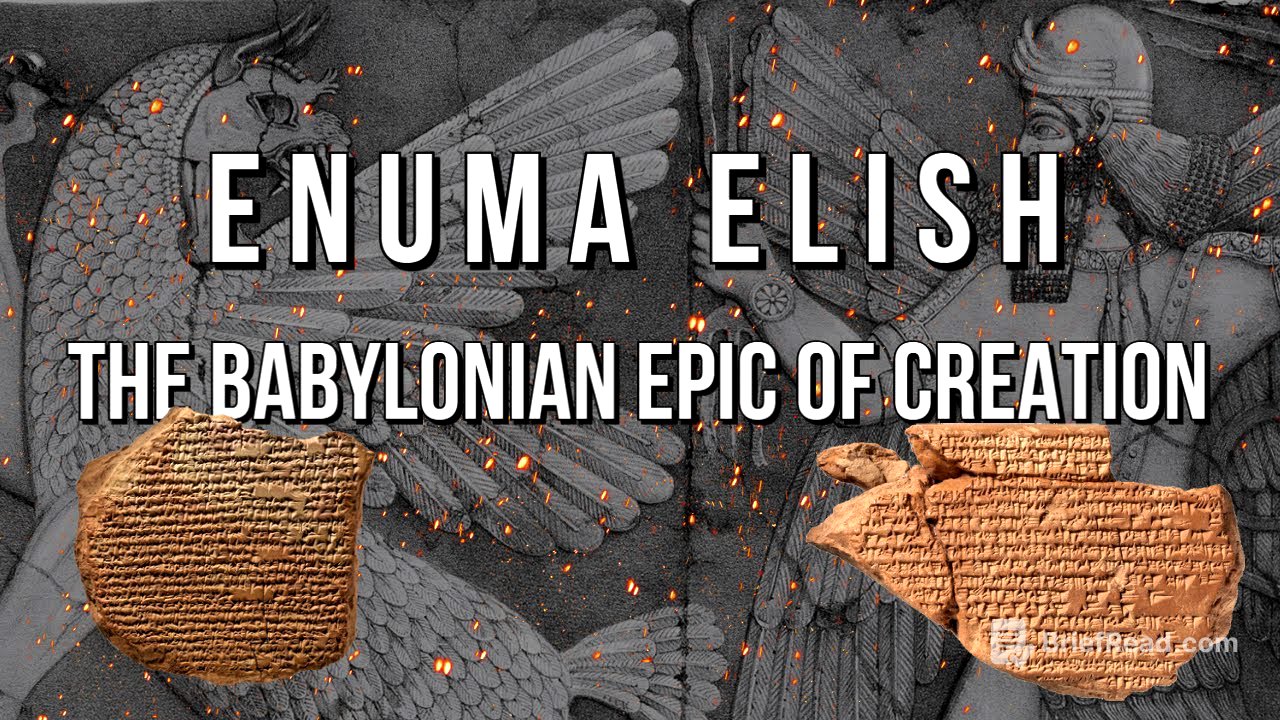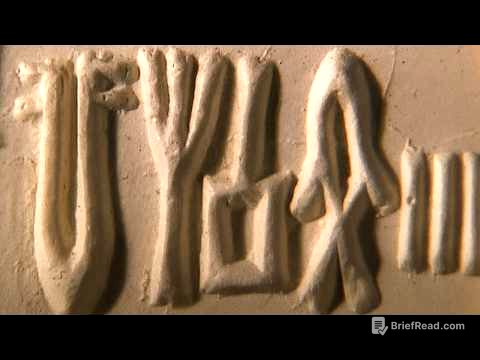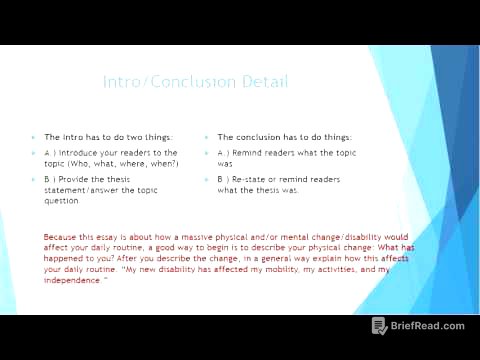TLDR;
The Enuma Elish, a Mesopotamian creation myth, narrates the birth of the gods, the creation of the universe, and the creation of human beings. It begins with undifferentiated water, which divides into the gods Abzu and Tiamat, whose union leads to the birth of younger gods. These gods create chaos, leading to a conflict between the old and new gods, culminating in Marduk's victory over Tiamat. From her corpse, Marduk creates the heavens and the Earth, establishing order and appointing gods to various duties. Humans are created from the blood of Kingu to serve the gods. The text highlights the rise of Marduk and Babylon, with parallels and differences to the biblical Book of Genesis, and concludes with the importance of the myth in Babylonian culture and its interpretation as a story of change and the rise of Babylon.
- The myth details the creation of the universe and humanity from primordial chaos.
- It emphasizes the rise of Marduk as the chief deity and the supremacy of Babylon.
- The story reflects themes of order versus chaos, generational conflict, and cultural change.
Introduction [0:07]
The Enuma Elish, also known as The Seven Tablets of Creation, is a Mesopotamian creation myth. The title comes from the opening lines of the text. Tablets containing the myth date back to around 1200 BCE, but are copies of a much older version from before the fall of Sumer in approximately 1750 BCE. The god Marduk is the champion of the younger gods against Tiamat. In the Sumerian version, AA Ani or Enlil likely played the major role. The copy found at Ashur places the god Ashur in the main role. Marduk's prominence is due to most copies being from Babylonian scribes, though AA still plays a part by creating human beings.
Summary of the Story [2:35]
The Enuma Elish tells the story of the birth of the gods, the creation of the universe, and the creation of human beings. In the beginning, there was only undifferentiated water swirling in chaos, which divided into sweet fresh water, known as the god Abzu, and salty bitter water, the goddess Tiamat. Their union gave birth to the younger gods, who were extremely loud, troubling Abzu's sleep and distracting him from his work. Abzu, advised by his viser Mumu, decides to kill the younger gods. Tiamat warns her eldest son, Eni (sometimes Aya), who puts Abzu to sleep and kills him. From Abzu's remains, Eni creates his home. Tiamat, enraged by the death of her mate, consults with the god Quu, who advises her to make war on the younger gods. Tiamat rewards Quu with the tablets of Destiny, which legitimize the rule of a god and control the fates, and he wears them as a breastplate. With Queen goo as her champion, Tiamat summons the forces of chaos and creates 11 horrible monsters to destroy her children. Aya enki and the younger gods fight against Tiamat futilely, until Marduk emerges as their champion, swearing to defeat Tiamat. Marduk defeats kingu and kills Tiamat by shooting her with an arrow, which splits her in two. From her eyes flow the Waters of the Tigris and Euphrates rivers, and from her corpse, Marduk creates the heavens and the Earth. He appoints gods to various duties and binds tiamat's 11 creatures as trophies.
Commentary [6:12]
The Enuma Elish later inspired the Hebrew scribes who created the biblical Book of Genesis. Before the 19th century CE, the Bible was considered the oldest book with original narratives. However, excavations in Mesopotamia revealed that many IAL narratives were Mesopotamian in origin. Stories like the fall of Man and the great flood were originally conceived in Sumer, translated and modified in Babylon, and reworked by the Assyrians before being used by the Hebrew scribes. While the basic Paradigm aligns closely, significant differences exist. Both Genesis and Enuma Elish are religious texts detailing cultural Origins. Genesis describes the origin of the Jewish people under the Lord, while Enuma Elish recounts the origin of Babylon under Marduk. Each work begins with watery chaos and primeval darkness, followed by the creation of light, heavens, heavenly bodies, and finally, man.
The Anum Alish in Babylon [9:13]
Marduk gained prominence in Babylon during the reign of hamurabi (1792 to 1750 BCE), superseding the goddess en in worship. Many previously popular female deities were replaced by male Gods. The Enuma Elish, praising Marduk as the most powerful god, became increasingly popular as Marduk and Babylon grew in power. The rise of Marduk's cult is closely connected with the political rise of Babylon from city state to the capital of an Empire. From the cite period, Marduk became increasingly important, with the Babylonian epic of creation maintaining that Marduk was king of all gods and that many gods were aspects of his Persona. The Enuma Elish was read and recited widely throughout Mesopotamia, especially at the New Year Festival in Babylon. During this Festival, the statue of Marduk was paraded through the city to vacation in a small house built for this purpose, with tablet 7 being sung or chanted during the procession.
Text of Enuma Elish: Tablet 1 [11:00]
When the heavens and Earth did not exist, there was absu, the first begetter, and Tiamat, who gave birth to them all. They mingled their Waters together before Meadowland and reedbed were to be found. The gods were created within them, and as they grew, Anu their son rivaled his fathers. The Divine Brothers came together, their clamor throwing Tiamat into turmoil and disturbing absu. Abzu decided to destroy their way of life, but Tiamat raged and grieved over the plotted evil. Mumu advised absu to destroy the Lawless way of life so he could rest. Abzu was pleased and plotted against the gods. The gods heard of the plot and were frantic. Aya, skilled in knowledge, poured sleep upon absu, split him Senus, ripped off his crown, and killed him. Aya then set his dwelling upon absu and laid hold on Mumu.
Text of Enuma Elish: Tablet 2 [21:59]
Tiamat gathered her creation and organized battle against the gods because of absu. Aya learned of her plans and lapsed into silence. He then related tiamat's plotting to Anar, his father, explaining how all the gods had turned to her and were fiercely plotting unrest. Mother hubber supplied weapons and gave birth to Giant serpents and fearful monsters. Tiamat exalted chingu and entrusted him with Supreme command, giving him the tablet of Destinies. Anar was profoundly disturbed and cried wo. Nimod answered his father with soothing words, reminding him of the helpful deed he performed by killing absu. Anar then told Aya to go before Tiamat and appease her, but Aya perceived her tricks, stopped, and turned back. He told Anar that tiamat's Deeds were too much for him and that her strength was mighty. Anar lapsed into silence, and the igigi and anunaki sat in tight-lipped silence. AA summoned Marduk to explain his plans, telling him to appease Anar. Beel rejoiced and stood before Anar, who filled with satisfaction and told him to appease Tiamat with his pure spell.
Text of Enuma Elish: Tablet 3 [30:36]
Anar sent Kaka to LMU and La AMU to bring the gods to his presence, so they could decree the Destiny for Marduk. Kaka stood before them and repeated Anar's message, explaining that Marduk had determined to meet Tiamat and needed his Destiny decreed. Laha and lahamu cried aloud, and all the IGI moaned in distress. The great Gods gathered and entered the presence of Anar, filling with joy. They conferred, ate grain, drank ale, and decreed the Fate for Marduk.
Text of Enuma Elish: Tablet 4 [32:46]
The gods set a lordly Dias for Marduk, and he took his seat before his fathers to receive kingship. They honored him among the great Gods, declaring his destiny unequaled and his command like Anu. They gave him the power to exalt and a base, and decreed that none would transgress his line. They gave him kingship over the universe, instructing him to slay his enemies and spare those who trust in him. They set a constellation in the middle and commanded Marduk to bring about Annihilation and Recreation, which he accomplished, causing the gods to rejoice. They gave him a mace, a throne, a rod, and an irresistible weapon, telling him to cut TI M's throat and let the winds bear up her blood. Marduk fashioned a bow, arrow, club, and net, and stationed the Four Winds to prevent any part of Tiamat from escaping. He fashioned the evil wind, dust storm, Tempest, and set out the seven winds to harass tats and trails. He rode the fearful Chariot of the irresistible storm, clad in a Tunic and an aura of Terror. He set his face toward the Raging Tiamat, holding a spell and a plant to counter poison.
Text of Enuma Elish: Tablet 5 [42:22]
Marduk fashioned Heavenly stations for the great gods and set up constellations, marking off divisions and setting up three stars each for the 12 months. He established the Heavenly station of neberu to fix the Stars intervals and fixed the Heavenly stations of enel and Aya. He created Nar and appointed him as the Jewel of the night to fix the days and month. He decreed the organization of front and made the day, letting the year be equally at the new year. He fashioned clouds from tiamat's foam and appointed the Raging of the Winds and violent rainstorms. He opened the abyss and sated it with water, letting the Euphrates and Tigris flow from her two eyes. He heaped up the distant mountains of her breasts and bored Wells to channel the Springs. He twisted her tail into the door mahu and set up her crotch to wedge up the Heavens. He stretched out half of her and made it firm as the Earth. He attached guide ropes and put them in aa's hands, taking charge of the tablet of Destinies and presenting it to Anu. He broke the weapons of the 11 creatures to which Tiamat had given birth and made images of them at the Gate of the absu. The gods saw it and were jubilantly happy, with Anar embracing him and publishing abroad his title Victorious King.
Text of Enuma Elish: Tablet 6 [51:29]
Marduk conceived a desire to accomplish clever things and addressed aah, stating his plan to bring together blood to form bone and create Lulu, whose name shall be man, to bear the toil of the Gods. Aah agreed, suggesting that one brother be given up to be fashioned into people. Marduk assembled the great Gods and asked who instigated Warfare, leading to Tiamat's Rebellion. The gods identified chingu, who was then bound and penalized. From his blood, aah created mankind, imposing the service of the Gods upon them. Marduk divided the gods into upper and lower groups, assigning 300 to guard the decrees of Anu in the Heavens and 600 to the Nether world. The anunaki then requested to build a shrine of great Renown for Marduk, which he approved. The anunaki built Babylon, molding bricks for one year and raising the peak of igel in the second year. Bael seated the gods at the banquet in the lofty Shrine, declaring Babylon their fixed dwelling. After enjoying themselves, they held a service in awesome igel, confirming the regulations and rules.
Text of Enuma Elish: Tablet 7 [1:02:41]
This tablet details the 50 names of Marduk, each representing different aspects of his power and role in the cosmos. These names include Asar, the Giver of arable land; AAR Alim, revered in the council chamber; tutu, who accomplishes their renovation; shazu, who knew the of the Gods; ENB belulu, the Lord who supplies them abundantly; cir, who heaped up a mountain on top of Tiamat; Gil, whoever heaps up piles of bar; agalma, the lofty who snatches off the crown; zulum, who assigns Meadows for the gods; Mumu, creator of heaven and underworld; Gish numab, creator of all the peoples; Lugal abdur, the king who scattered The Works of Tiamat; pagal guenna, foremost of all Lords; Aruna, counselor of Aya; dumuku, who renews for himself in his pure Abode; Lugal shuana, the king whose strength is exalted among the gods; UGA, who plundered them all in the sea; K chingu, who plundered chingu in battle attle; kinma, the director of all the gods; dingar Asis, let him take his lofty seat in the house of benediction; guu, who makes weapons hard; asaru, who as his name says mustered the Divine Fates; and nabberu, let him hold the Crossing Place of heaven and underworld. The tablet emphasizes the importance of remembering and expounding these names, as doing so will lead to prosperity and well-being.
Conclusion [1:15:32]
The Enuma Elish can be interpreted as a parable of the rise of Babylon and Babylonian culture over the old Sumer model of civilization. It illustrates the concept of life as Perpetual change, with the old static gods replaced by younger, more Dynamic Gods who introduce change and mutability through the creation of mortal beings. These creatures help the gods maintain their creation, playing an integral role in the my.









